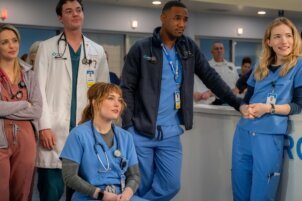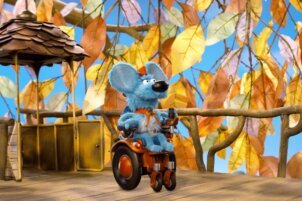Series Production Team Includes Variety of Neurodivergent Writers, Production Staff, Animators, Advisors, and Voice Talent
PBS Kids has a history of ensuring authentic inclusion in its series. Its newest show Carl the Collector not only continues this pattern but elevates it. The 2D animated series, aimed at 4-to-8-year-olds, features Carl, a warm-hearted autistic raccoon who enjoys collecting things, and his woodland creature friends including Lotta, a quiet and self-assured fox who is also autistic.
By featuring two autistic characters, viewers can better understand that autistic individuals are not all the same. Carl pays extraordinarily close attention to detail and comes up with unique ideas that others might not consider. His collections help him solve problems. While Carl is sensory seeking, Lotta experiences hypersensitivity to loud sounds, powerful smells, and certain food textures. Lotta also has exceptional talents in art and music.
Hiring an Authentic Team
Carl and Lotta both showcase an authentic representation of autism. This is helped by a production team that includes a variety of neurodivergent writers, production staff, animators, advisors, and voice talent.
One of the writers is Ava X. Rigelhaupt, an alumna of a variety of Disability Belongs™ pipeline programming, including the 2024 Writing for Comedy Intensive. She immediately felt embraced by the entire team and was treated as an important member of the team.
“The team has really done a great job speaking to me and other autistic people on the team on the nuances of autism, and how Carl and Lotta may be similar and also might be different,” she said, noting how they each “might feel about different situations and interpret different situations.”
According to Think Tank for Inclusion and Equity, just two percent of TV writers identify as disabled. However, creator and executive producer Zachariah OHora and Director Lisa Whittick, who has an autistic child, made hiring Autistic team members a priority.
“Having close ties to the autistic community through my son, I know how important it is to autistic people to tell their own stories, so hiring autistic/disabled/neurodivergent crew was absolutely crucial in ensuring the authenticity of the series,” Whittick said. “Our entire team is a beautiful mix of neurotypical and neurodivergent people which perfectly reflects the characters we see in Fuzzytown and goes a long way in making each episode feel ‘real.’ The authentic vibe of the show is one of the things I’m most proud of.”
“We did not want to try to tell someone’s story for them,” OHora added. “From the start, we hired autism experts to learn from and guide every step of development. And just as important, we found neurodiverse people who could share their own stories and experiences that would inform the show. The show producers at Spiffy Pictures reached out to a number of advocacy groups, including Disability Belongs™, and were connected with some wonderful autistic writers. It was word of mouth from there.”
OHora specifically praised Rigelhaupt for her contributions. “Writer Ava Rigelhaupt brought powerful stories that came from her own experience. She wrote the episode ‘The Fall’ in which Carl discusses his autism with his Mama and friends, and it’s one of the most important and moving episodes of the series.”
In “The Fall,” Carl’s friend falls and he does not know how to help. The is based on a time when Rigelhaupt’s mom fell.
“Like Carl, I was really scared, and I froze,” Rigelhaupt said. “For me, autism feels like everyone read this social skills role book except for me, and I am still expected to take the test. Showing this scenario could help Autistic kids explain themselves, and help non-autistic kids to understand their peers’ reactions.”
Rigelhaupt worked closely with Head Writer Adam Rudman, who also is Co-Founder of Spiffy Pictures. She said Rudman helped her understand how to utilize notes, as well as “ensure authenticity and sincerity while also including comedic elements” in her writing.
“Working one-on-one with Ava Rigelhaupt and our team of passionate neurodiverse writers has had a profound impact on the authenticity and relatability of the series, the characters, and the stories we are wanting to tell for all kids and families,” Rudman said.
Another Autistic writer for this series is Ty Freedman, an alumnus of the 2021 Disability Belongs™ Entertainment Lab and 2022 Disability Belongs™ Children’s Content Lab for Disabled TV Creators. He credits his positive experience on the show to Rudman, as well as educational consultants Dr. Stephen Shore, who is autistic himself, and Dr. Geraldine Oades-Sese, who “built a working style that helped me feel comfortable to write authentically.”
“I feel really fortunate to have been chosen to write for a series that aligns with my lived experience and to have the opportunity to examine, write, and include moments of my own life within my scripts,” Freedman said. “I’ve learned so much working on this series. There were times that what I was writing was mirrored in my own life, and I was able to navigate through it better by thinking how Carl and his friends would do it. It makes me proud to know kids will be able to see this show and do the same.”
Ensuring Authentic Casting
Even when a show includes a disabled character, the actor is usually not disabled as well. For Carl the Collector, the team ensured they hired disabled voice actors for the roles of Carl and Lotta, as well as for additional ancillary characters.
“When we got to casting, we knew we had to have autistic actors voicing the characters on screen too,” OHora said. “Director Lisa Whittick put out a casting call via a group she belongs to for families with autistic children. That’s how we got Kai and Maddy (the voices of Carl and Lotta) and many other neurodiverse talent who voice other characters for the show.”
Whittick said that their voice director worked with each voice actor “to identify their comfort levels and create accommodations to help them thrive when they come into the studio.”
“As a result, they blossomed into incredible actors which will no doubt open up employment opportunities for them in the future if they decide to pursue acting as a career,” Whittick added.
See Yourself Reflected in the Media You Consume
Whittick wanted to empower neurodivergent individuals and children “to see themselves reflected in the media they consume.” As Carl the Collector is the first PBS series with an autistic lead character, Whittick believes “it will go a long way in helping autistic children and their families feel seen.”
“If this show had been around when my children were growing up, not only would we have likely gotten my youngest son diagnosed with Autism and ADHD earlier, but we would not have experienced the fear and stress of the unknown,” she added.
Rigelhaupt notes that this show is not only important for autistic kids to see themselves represented but also for neurotypical kids. Carl’s best friend Sheldon, an empathetic beaver, models the way a neurotypical child may help a neurodivergent friend navigate complex social nuances when necessary. The various characters work through problems together, while showing how they learn to express their emotions.
“Audiences are really hungry for this type of content,” Rigelhaupt said. “Autistic kids and neurotypical kids see friendships like theirs, and neurotypical kids can learn more about Autistic kids and how to navigate situations that Carl and his friends encounter.”
“I hope that neurodivergent and neurotypical kids and their families see themselves in the show and that the stories spread empathy and understanding,” Ohara added. “We don’t shy away from the tough parts, but we also celebrate all of our differences. The show is also about self-identity and managing your emotions and feelings, and there are a lot of moments when we demonstrate good techniques for doing exactly that such as belly breathing, taking a moment and talking to someone who cares about you.”
Whittick also hopes that other content makers will take notice. “I hope that the show encourages other producers and employers to be more inclusive when creating content and in their hiring practices,” she added.
After all, ensuring authentic hiring leads to authentic portrayals. With one-in-five people (including children) in the U.S. having a disability, there is a hungry market for authentically inclusive disability content.






